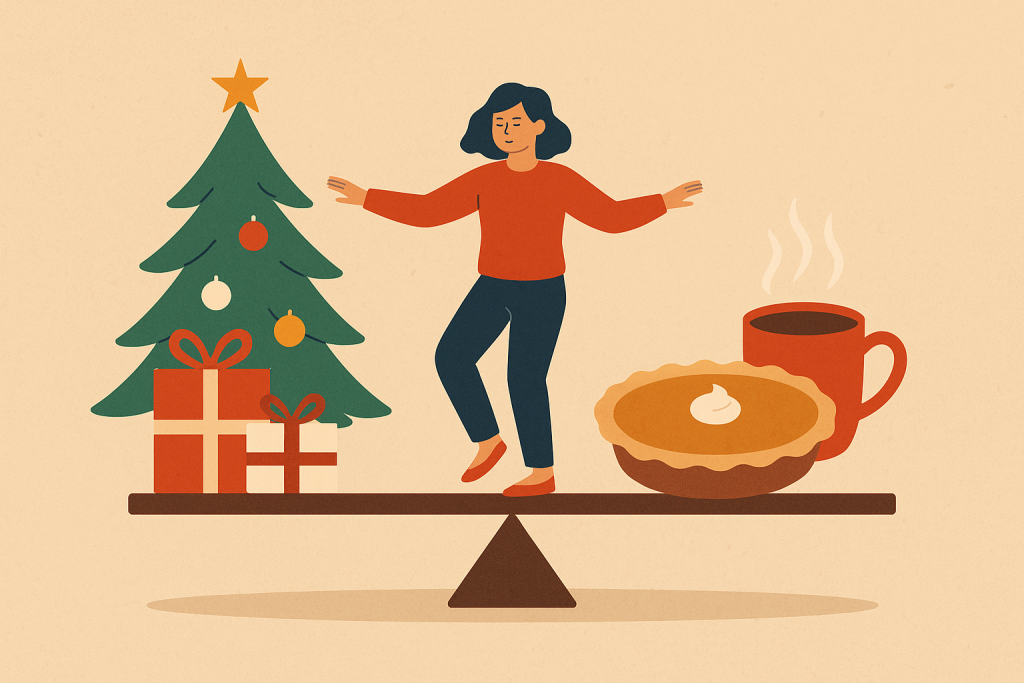The holidays have a way of turning everything up a notch. Food gets richer, drinks flow easier, and self-control quietly takes a backseat to the idea of “just this once.” Before you know it, one late night becomes five, and the new year starts feeling less like a reset and more like a recovery. The season’s magic isn’t the problem—it’s the way we get caught up in chasing it.
Social gatherings, family dynamics, and the endless swirl of expectations can flip old switches in the brain. Even people who usually have solid habits find themselves grazing the snack table or refilling a glass without thinking. It’s not about willpower; it’s about being human in a season that thrives on sensory overload. Recognizing that is the first step to keeping your balance without dampening your spirit.
The Hidden Stress of Celebration
Behind the cheerful lights and carols, there’s a subtle pressure that builds throughout the holidays. Some people feel it as financial strain, others as social fatigue, and many as a quiet ache for people or traditions that aren’t there anymore. That emotional cocktail can drive us toward comfort in predictable forms—food, drink, or overspending.
When you’re hosting Thanksgiving, for instance, you might feel like every detail has to be perfect. Guests will rave about the pie, but no one will remember if the napkins didn’t match. The trouble is that stress rarely shows up where it starts. It sneaks into our habits, pushing us to soothe or distract ourselves in ways that feel good for five minutes and lousy the next day. Recognizing those emotional triggers, instead of ignoring them, is how you start to loosen their grip.
When Tradition Turns Into Excuse
There’s a fine line between tradition and habit. Drinking spiked eggnog because it reminds you of your grandfather’s Christmas party? Lovely. Drinking three glasses because it’s “what we always do”? That’s the kind of autopilot behavior that can quietly spiral over time. The same goes for food, spending, or even arguing. Some family traditions don’t deserve to be inherited.
This isn’t about giving up joy or pretending the holidays aren’t indulgent by nature. It’s about choosing which traditions actually make you feel good afterward. If something leaves you anxious, exhausted, or ashamed once the lights go out, it’s worth reconsidering. Balance doesn’t mean depriving yourself; it means remembering you have a choice, even when everything around you is screaming “more.”
When the Holidays Collide With Recovery
For people in recovery—or even just trying to cut back—the holidays can feel like walking through a minefield made of tinsel. Every event seems to orbit around alcohol, and every commercial makes overindulgence look like a connection. The truth is, you can still enjoy the warmth and closeness of the season without pouring a drink. It just takes planning and honesty.
Choosing to attend gatherings where you feel supported matters more than showing up out of obligation. If that means skipping your office happy hour or leaving a party early, that’s not weakness, it’s wisdom. And if being around old triggers feels too risky, sometimes the best move is getting away entirely. Checking into drug rehab in Fort Worth, Boston or anywhere else away from the triggers doesn’t mean missing the holidays; it means reclaiming them on your own terms. Recovery isn’t about what you give up—it’s about what you finally get back.
The Quiet Trap of Comparison
Social media makes December look like one long, glittery commercial for happiness. Scroll long enough, and you start thinking everyone else is thriving while you’re just trying to survive. That quiet comparison game feeds insecurity and often leads to overcompensation—more gifts, more parties, more everything. But chasing someone else’s highlight reel is a losing battle.
You never see the arguments before the family photo or the credit card bill that lands in January. Real joy isn’t about the display, it’s about the moments that don’t need witnesses. You don’t have to top last year or anyone else’s year. You just have to get through this one feeling sane and mostly happy. That’s not low ambition; that’s realistic peace.
Simple Ways to Keep Your Balance
The antidote to overdoing it isn’t perfection; it’s mindfulness with a touch of humor. Eat the cookie, skip the guilt. Say no to plans that make you tense. Take a walk before pouring another drink. Replace “I have to” with “I choose to.” Those little shifts change the entire tone of the season. And if you slip up, so what? The goal isn’t to win the holidays—it’s to still like yourself when they’re over.
Having a few non-negotiables helps too: getting enough sleep, staying hydrated, and stepping outside once a day. Even a short breather can pull you back to center. The people who handle the holidays best aren’t the ones who say no to everything indulgent; they’re the ones who know when to pause, reset, and start fresh without guilt.
Keeping the Season Real
The beauty of the holidays isn’t in the excess, it’s in the connection that survives without it. You don’t have to escape the season to stay grounded; you just have to stop letting it run you. When you catch yourself reaching for something—another cookie, another purchase, another drink—take a second and ask whether it’s bringing you closer to peace or just numbing the noise.
The best part of this time of year isn’t what’s on the table or under the tree. It’s the chance to slow down long enough to remember what actually matters and leave the rest behind without apology.

